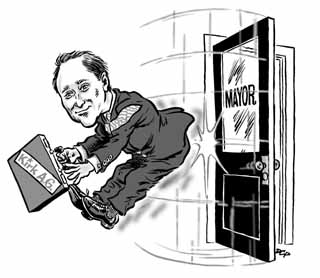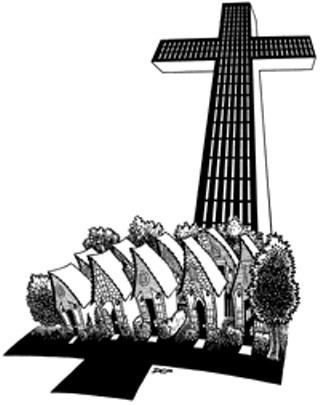News Top 10s
Fri., Jan. 4, 2002

Top 10 Things the City of Austin Didn't Accomplish in 2001 Face it, last year was pretty horrible all the way around, even before and aside from Sept. 11. In local politics, we're struck as much by what wasn't done -- couldn't be done, didn't get done, what have you -- as by the city's record of accomplishments. A list of what the city could have done that might have made a difference:
1. Raise Property Taxes: This is actually something the city couldn't bring itself to do for years, despite the massive growth in wealth and property values. Now, the city is in a substantial fiscal crunch, and we hear the city proposing to borrow money against a tax increase next year just to solve its current cash flow problem. Remember, Austin's property tax rate is far and away the lowest of any major Texas city. Of course, now property values are falling, so a tax hike won't even make much difference.
2. Put Fiscal Policy in the City Council's Hands: Even though the council is responsible for policy, the power of the purse -- which is taken quite seriously as a legislative duty, to be performed by elected officials, in most systems of government -- in Austin has been almost completely conquered by City Manager Jesus Garza. Council members routinely complain about how they don't really get to decide how most of the city's money gets spent. So when are they going to do something about it?
3. Deliver the Police-Oversight System Austin Wants: Or at least the one the Police Oversight Focus Group recommended in 2000 with much back-patting on the city's part. What we have instead is a city-staff-dominated scheme that police watchdogs consider a gutted shadow of what the POFG wanted. It's easy to blame the cops' union, the Austin Police Association, which used its "meet and confer" labor negotiations with the city as an opportunity to rewrite the POFG plan, but if APD brass and the city manager were suitably committed to civilian oversight, and if the City Council were paying sufficient attention, we could have had a more acceptable end result.

4. Make Neighborhood Planning Work: It took until the very last meeting of 2001 for the City Council to approve a neighborhood plan that hadn't nearly come unraveled in controversy. While each plan's problems were unique, all the crises had one thing in common: One or more members of the council decided that they weren't going to actually trust the wisdom of the planning teams, which was supposed to be the point. Until the council can say, unanimously, "That's what the planning team came up with, and we're going to support it, and we're not going to entertain every objection made by everybody who didn't get everything they wanted," then the conflict and chaos of land-use decision making in Austin will not change.
5. Create a Replacement for "Smart Growth": It was already pretty clear at the beginning of 2001 that, no matter how much they should want to, in-town neighborhoods were not keen on accepting high-density urban infill. Likewise, the wisdom of the incentive-driven downtown renewal strategy had already become specious. But here, a year later, we still don't have any outline of what the city's growth management and economic development strategy is going to be instead -- mostly, we suspect, because Mayor Kirk Watson, his sights firmly focused on his campaign for state attorney general, lost interest in the subject for which, a year earlier, he was lauded as a visionary.
6. Tell Kirk Watson to Get Lost, Already: Not that he wasn't a good mayor, but he pretty clearly ceased to be one as soon as his statewide ambitions took precedence. We're not sure who would have had the standing to tell Watson that he should have resigned long before he did -- like, maybe, in March -- but much time would not have been wasted.
7. Settle the Hyde Park Baptist Mess: Does the city want this deal to be resolved or not? First the council sides with the neighborhood, but then Watson obstinately sides with the Baptists, and finally the council puts off making a decision one too many times, and the Baptists file a bunch of site plans that the city may have no choice but to let them build, regardless of what the neighbors think. Do you think Hyde Parkers view the city as an honest broker here?
8. Avoid Rolling Over on the Bennett Tract: A similar situation -- after months and months of telling developer Matt Mathias and the Bennett Tract's Eastside neighbors to negotiate and come up with a workable compromise, the council ended up giving Mathias pretty much everything he asked for, provoking a civil rights lawsuit from the neighborhood. Was the city dishonest before, or did the council lose its collective mind when it took the vote?
9. Seek Strategies to Diversify the Economy: Since 9/11, we haven't heard very much about a mega-million incentive package for Advanced Micro Devices, but even before then we would much liked to have seen that kind of money put into assistance for employers other than high-glamour tech titans. The city has done some important things to help small businesses, but it's a drop in the bucket compared to the sugar we've thrown at big companies, and if our development strategy now is simply to wait until the tech industry's fortunes improve, that hardly seems to befit the "City of Ideas."
10. Escape From Seton's Domination: This is actually something that's been brewing for a long while -- like since Seton took over operating Brackenridge Hospital. The city could have easily foreseen from the beginning that eventually a Catholic hospital would not provide the reproductive-health services Austinites deserve and demand, and started working on an alternative before being caught under the gun this fall. Even the best solution that may come out of the current imbroglio will likely be inferior to one we could have had otherwise.
Got something to say on the subject? Send a letter to the editor.






